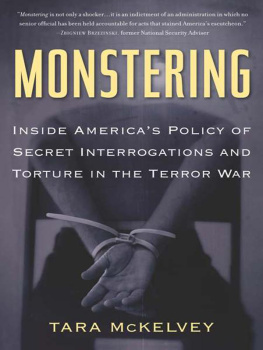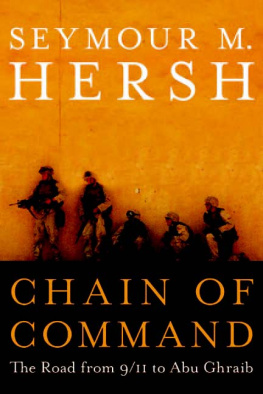PRAISE FOR MONSTERING
Few journalists have ventured beyond the accepted story of Abu Ghraib and attempted to uncover new material, new evidence and to provide a new perspective. McKelvey has done so. Her reporting breaks important groundfrom interviews with ex-prisoners, through the comic book farce of the false identification of the Hooded Man, to the spectacle of American servicemen left high and dry, her book has provided an account that embraces the scope of the human tragedy and reminds us of the human cost of war.
ERROL MORRIS, Academy Award-winning
filmmaker of The Fog of War
As a documentary work, Monstering will prove to be indispensable as a history of the war on terror.
The Arab American News
A book that is painful, haunting and ultimately necessary to any examination of a world in which Lord of the Flies seemed to meet FastTimes at Ridgemont High to devastating effect.
The Daily Kos
McKelveys research is impressive. Her litany of pain and suffering is equal parts enlightening and exhausting.
St. Paul Pioneer Press
The most poignant component of McKelveys book is her presence in the work... the reader is left humbled at her exhaustive reporting. It is both heartening and heartbreaking to think that journalists are picking up this much government slack.
AlterNet.org
After reading this compelling work, it is difficult to dismiss such incidents as the above as being the isolated acts of a few junior enlisted personnel or something that no longer happens as some apologists maintain.
JOHN R. GUTHRIE, Harvard Square Commentary
Tara McKelvey is an extraordinarily gifted writer and Monstering is an extraordinary book.The most troubling revelation in the book is not that there are monsters, but that they look like you and me.
JAMES BAMFORD, author of A Pretext for War: 9/11,
Iraq and the Abuse of Americas Intelligence Agencies
The so-called war on terrorism is riddled with nightmarish accounts of abuse. But for all the attention devoted to these matters, the full story has not come out. Monstering, though, takes the reader into this hellish world and advances the story, disclosing revelations of US power gone wrong and detailing how the Bush administration destroyed Americas image. McKelvey has produced a frightening, disturbing and valuable book.
DAVID CORN, co-author of Hubris:The Inside Story of
Spin, Scandal, and the Selling of the Iraq War
From How could it have happened? to How could it not have happened? McKelveys investigation into the stories of individuals who perpetrated, witnessed and suffered from US detention policy in Iraq is a careful exposmust-reading for those who seek to understand more fully the unfortunate, sordid side of the war on terror.
KAREN J. GREENBERG, co-editor, The Torture Papers:
The Road to Abu Ghraib
With this book,Tara McKelvey risks a long and harrowing look into a deep and roiling abyss. But her gaze is steady, her witness clear, and her outrage all the more lucid for being so fiercely contained. This is reportage of the most urgent sort.
LAWRENCE WESCHLER, author of A Miracle, A Universe:Settling Accounts with Torturers
MONSTERING
INSIDE AMERICAS POLICY OF
SECRET INTERROGATIONS AND
TORTURE IN THE TERROR WAR
MONSTERING
INSIDE AMERICAS POLICY OF SECRET INTERROGATIONS AND TORTURE IN THE TERROR WAR
TARA MCKELVEY
Hardcover edition published in 2007 in the United States
by Carroll & Graf Publishers
Paperback edition published in 2008 by Basic Books,
A Member of the Perseus Books Group
Copyright 2007 Tara McKelvey
All rights reserved. No part of this book may be reproduced in whole or in part without written permission from the publisher, except by reviewers who may quote brief excerpts embodied in critical articles and reviews. For information, address Basic Books, 387 Park Avenue South, New York, NY 10016-8810.
Books published by Basic Books are available at special discounts for bulk purchases in the United States by corporations, institutions, and other organizations. For more information, please contact the Special Markets Department at the Perseus Books Group, 2300 Chestnut Street, Suite 200, Philadelphia, PA 19103, or call (800) 255-1514, or e-mail .
A CIP record for this book is available from the Library of Congress.
Hardcover: ISBN-13: 978-0-78671-776-7
Paperback: ISBN-13: 978-0-465-00546-8
eBook ISBN: 9780786732142
10 9 8 7 6 5 4 3 2 1
Interior design by Sue Canavan
Printed in the United States of America
FOR MY DAD
PREFACE
O n September 10, 2004, I interviewed a Baghdad-based activist named Yanar Mohammed about womens shelters she had opened in Baghdad and Tikrit. She told me that one of her clients had been raped by an American soldier and was being threatened with an honor killing because she had been sexually assaulted. Abu Ghraib was the tip of the iceberg, Mohammed said, describing other ways American troops were abusing Iraqis and creating havoc in their country. The following month, I had dinner with a high-level congressional aide, Charlotte Oldham-Moore, who was familiar with issues handled by the Senate Foreign Relations Committee. She told me that Iraqi women were being held prisoner at Abu Ghraib. I decided to find out what had happened to these women as well as to the men and children who had been held at the prison.
In December 2004 I went to Amman, Jordan, and became the first American journalist to speak with female detainees who had been held in Abu Ghraib. Most of the former detainees I met were putative plaintiffs in a lawsuit, Saleh v. Titan, that was filed by a Philadelphia attorney, Susan L. Burke, and lawyers from a New York-based nonprofit organization, the Center for Constitutional Rights, against two private military contractors that sent interpreters and interrogators to Abu Ghraib. I went back to Amman in March 2006 to interview another group of former detainees and heard dozens of accounts of rape, assault, and murder from individuals who had been imprisoned in U.S.-run detention facilities.
I was not always sure whether I could trust the former detainees. They had reason to hate Americans, and they were at times aggressive during the interviews. Yet they shared information with me about their detentions, including descriptions of the physical layout of U.S.-run prisons and jails; the manner and style, as well as the language, used during interrogations; and other details that tended to corroborate descriptions provided by authors of military investigations, human-rights reports, and government documents about the prisons in Iraq.
For nearly two and a half years, I conducted interviews with Iraqi government administrators, business leaders, and engineers who had been imprisoned in U.S.-run detention facilities, as well as with U.S. Army officers, soldiers, human-rights lawyers, former administration officials, and private contractorsaltogether, more than two hundred people who were familiar with the subject of my book. Official reports about the Abu Ghraib photographs, which were first seen by the public on 60 Minutes II on April 28, 2004, made it seem as though the abusive acts were perpetrated by a rogue band of soldiers and were confined to a single prison. Over time, I became increasingly skeptical of that explanation.
On the evening of December 8, 2004, in a hotel room in Amman, I met with a thirty-seven-year-old Iraqi lawyer, Nabil, a former diplomat who had attended the UN General Assembly in New York in December 2001. (I had an administrative job, he says.) [Like many of the people I interviewed for this book, he asked me to use pseudonyms for him and his family members for security reasons. Several of my sources had received death threats before I interviewed them. Two were killed afterward.] Nabil is a tall man with a high forehead, and he was dressed in a white shirt with cuff links, a wool vest, and wire-rimmed glasses. He was accused of having ties with the insurgency and was arrested on September 28, 2003, and held at various detention facilities, including Abu Ghraib, until May 28, 2004.A U.S. military official confirmed he was released from Abu Ghraib on that date.




